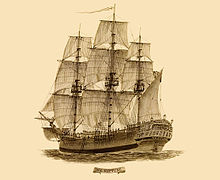Charles Bateson
Charles Bateson (4 August 1903 – 5 July 1974) was a maritime historian, journalist and author.[1][2]
Early life
Charles Henry Bateson was born in Wellington, New Zealand, son of Charles Bateson, a company manager born Liverpool, England, and mother Alice Lowe, née Rossiter, from Wales. He was educated at Hurworth school, Taranaki, before migrating to Australia in 1922.[1][2]
Career
Journalist
Charles Bateson worked as a journalist for a number of Australian papers. He worked for newspaper proprietor Ezra Norton's "Truth and Sportsman Ltd" becoming a talented administrator and lead writer for the Sydney Truth and Melbourne Truth.[1] After Norton's newspapers were taken over by News Ltd Bateson became editorial manager of Mirror Newspapers Ltd, before helping launch The Australian newspaper.[1][2]
War correspondent
Working for the Department of the Interior during World War II first as a publicity officer and then as principal information officer, he later became a war correspondent. It was during this time that he met two pilots in London with whom he collaborated in writing two of his early works as a writer: Spitfires over Malta (1943) and First into Italy (1944).[1]
Author
After his journalistic career Bateson pursued his interest in writing particularly in the maritime history of Australia and the Pacific. He was editor of The Log, the official journal of the Australian and New Zealand branch of the World Ship Society between 1958 and 1966. Bateson's greatest success came with the publication of The Convict Ships 1787–1868 (first published 1959). Containing a comprehensive list of convict transports to the Australian colonies between 1787 and 1868 this remains the standard reference work of its type, an indispensable tool especially for those researching convict ancestry.[3][4]
Another publishing success came with Australian Shipwrecks (1972). Bateson completed the first volume in what was to be a six volume series of books on maritime disasters in Australia. After his death the series was completed by Jack Loney.[5]
Bateson bequeathed his collection of 1300 books and his personal papers to the Mitchell Library, State Library of New South Wales.[1][6][7]
List of works
- Spitfires over Malta (1943)
- First into Italy (1944)
- The Convict Ships 1788–1868 (1959)
- Gold fleet for California: forty-niners from Australia and New Zealand (1964)
- Patrick Logan – tyrant of Brisbane Town (1966)
- The War with Japan: a concise history (1968)
- Early sailor (1968)
- Early soldier (1968)
- Early surveyor (1970)
- A Chartmaker (1972)
- A Gold commissioner (1972)
- Australian Shipwrecks v1: 1622–1850 (1972)
- Dire Strait: a history of Bass Strait (1973)[1][2][8]
Personal life
Shortly after arriving in Australia, Bateson met and married journalist Coy Catherine Foster-Lynam on 27 August 1923 at St Peter's Anglican Church East Sydney.[1] Bateson pursued his interests in military, naval and maritime history throughout his life particularly in retirement and was a member of the Royal Australian Historical Society.
Bateson died of coronary vascular disease at Vaucluse in Sydney on 5 July 1974, survived by his second wife Ann and daughter Louise of his first marriage.[1]
References
- ^ Jump up to: a b c d e f g h i Fletcher, B.H. "Bateson, Charles Henry (1903–1974)". Charles Henry Bateson (1903–1974). National Centre for Biography, Australian National University. Retrieved 15 July 2016.
{{cite book}}:|website=ignored (help) - ^ Jump up to: a b c d "Who's who in Australia: XXth Edition". State Library of New South Wales Catalogue. The Herald and Weekly Times Limited, Melbourne. 1971. Retrieved 17 July 2016.
- ^ "Family History Research Guide – Convicts: Bound for Australia". State Library of New South Wales. Retrieved 16 July 2016.
- ^ Evans, Vaughan (December 1979). "They came by convict transport". Descent: Journal of the Society of Australian Genealogists. 9 (4): 126–129. Retrieved 17 July 2016.
- ^ "Book Review: Australian shipwrecks: including vessels wrecked en route to or from Australia, and some strandings. Volume 1, 1622–1850". Journal of the Royal Australian Historical Society. 60 (4): 257–58. December 1974. Retrieved 17 July 2016.
- ^ Mitchell Library (1986). Bateson collection: a complete listing of titles acquired by the Library from the Estate of Charles Henry Bateson. Mitchell Library, State Library of New South Wales. Retrieved 19 July 2016.
{{cite book}}:|website=ignored (help) - ^ "Bateson Collection on Ships and Shipping". State Library Catalogue. Retrieved 19 July 2016.
- ^ "State Library Catalogue Author search". State Library Catalogue. State Library of New South Wales. Retrieved 17 July 2016.
Further reading
- "Charles Bateson – papers, ca. 1916–1974". Manuscripts and Pictures Catalogue. State Library of New South Wales.

